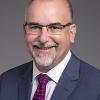Rush’s Acoustic Neuroma Program relies on a well-developed team approach to managing vestibular schwannomas, with experienced surgeons and radiotherapists who design custom treatment plans for each patient. Designated a Multidisciplinary Team of Distinction by the North American Skull Base Society, we work across specialties to make sure that all care options are explored, whether they include observation, surgery or stereotactic radiosurgery.
All of our surgeons have several years of experience treating acoustic neuromas and have contributed to the study and treatment of these tumors with national and international publications. Rush is also a gold sponsor of the Acoustic Neuroma Association, the premier organization for providing resources to those affected by the condition.
Our team guides each patient from diagnosis through treatment and follow-up care. Diagnostic options include our new MRI scans that can detect small tumors in early stages and audiometric and vestibular function tests. For those who need follow-up care, our neurologists and neurosurgeons work closely with specialists in hearing loss rehabilitation, facial reanimation surgery, balance retraining and auditory implants.
Who Are Ideal Candidates for Acoustic Neuroma Treatment at Rush?
Any patient with an acoustic neuroma and related symptoms will find expert care at Rush. This includes those who have been newly diagnosed, need follow-up care after treatment, have a tumor that is still growing after radiation therapy or are seeking a second opinion on their diagnosis or treatment options.
Many patients are treated with radiotherapy when observation and monitoring should be the first option for care. That's why our team works across specialties to evaluate and inform patients about all options before starting treatment. We ensure patients get the most appropriate, least invasive care available. And we refer patients to rehabilitation services if needed.
Why Refer Patients Here for Acoustic Neuroma Treatment?
- Full range of treatments: Because Rush offers all three usual approaches to acoustic neuroma care — observation, surgery and stereotactic radiosurgery — we can provide an unbiased opinion on care. Our specialists will only explore the most effective, least invasive approaches before considering invasive treatments.
- A team approach: Our providers will work with physicians across specialties and have been designated a Multidisciplinary Team of Distinction by the North American Skull Base Society. They work with our Auditory Implant Program, Facial Plastic and Reconstructive Surgery, Neurological Surgery, Otorhinolaryngology (ENT), Outpatient Physical Therapy, Radiation Oncology and Skull Base and Pituitary Surgery.
- Nationally renowned care: Rush is a gold sponsor of the Acoustic Neuroma Association, and U.S. News & World Report includes Rush on its Best Hospitals Honor Roll and ranks our ENT and neurology and neurosurgery programs among the nation's best.
- Close to where your patients live: Surgery and radiation therapy are provided at Rush University Medical Center in Chicago, but evaluations and follow-up care are also offered at our locations in Oak Brook, Illinois, and Munster, Indiana.
What Is the Process for Referring a Patient?
To refer your patient, you can call our Provider Express Line at (312) 947-4725 or visit our Referring and Transferring Patients page to learn more and find out online provider referral form. Our Acoustic Neuroma Program also has a dedicated liaison who works with several practices and may be able to assist you with the referral process.
Most patients are seen within seven days of requesting an appointment. The team will communicate to you any findings and care plans they recommend for your patient.
Acoustic Neuroma Conditions We Treat
- Acoustic Neuroma (Vestibular Schwannoma)
- Neurofibromatosis Type 2 (NF2)
Acoustic Neuroma Treatments and Tests Offered
- Auditory Osseointegrated Implants (Baha)
- Balance Retraining
- Cochlear Implants
- CT Scan
- Facial Reanimation Surgery
- Hearing Test (Audiogram)
- MRI
- Radiation Therapy
- Stereotactic Radiosurgery (SRS)
- Surgical Excision
- Vestibular Evoked Myogenic Potential (VEMP) Test
- Videonystagmography (VNG)




